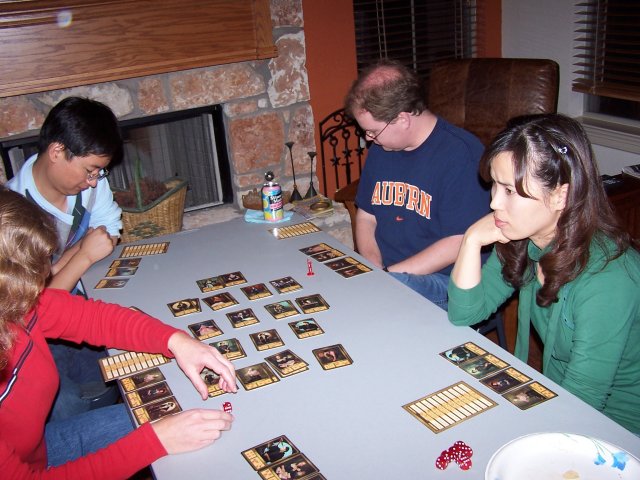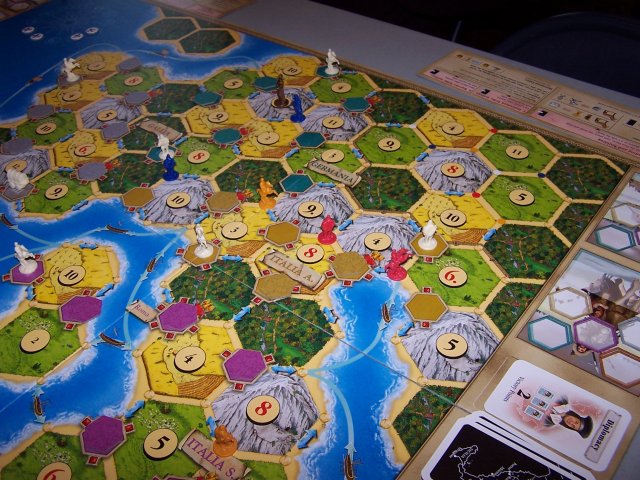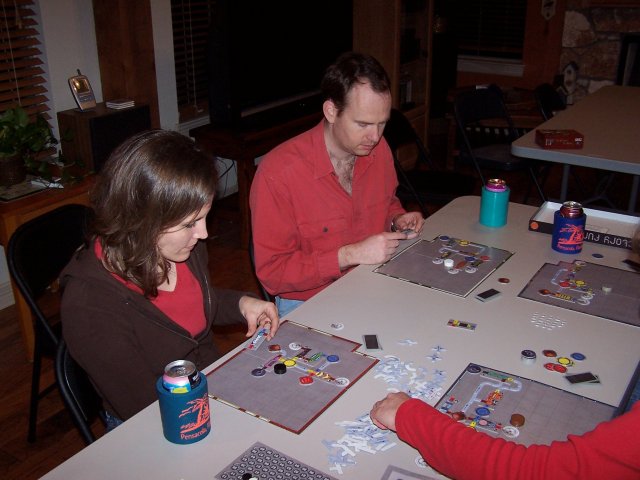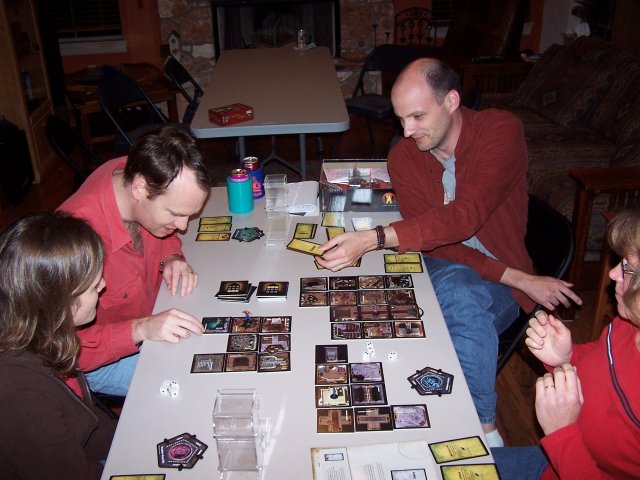
January 16, 2007Game Day Report for January 13, 2007by Susan Rozmiarek
Saturday we had a large turnout with a couple of new folks and an out-of-towner that we only knew previously online. It's always nice to put a face to a familiar BGG avatar. For a warm-up while waiting for others to arrive, I suffered through a game of Call My Bluff. I didn't mind playing so much this time as I managed to stay in at least half of the game for a change. Struggle for RomeHappy, happy! The UPS guy delivered a shiny, new English version of this the newest Catan game on Friday, just in time for today's gaming. While I consider the original Settlers of Catan to be a good game, it can't hold a candle to some of the historical versions. For some reason, extra chrome goes a long way with me when it comes to Settlers. Struggle for Rome is second in a series that began with Settlers of the Stone Age, another excellent game. Upon opening the box, I was "wowed" by plastic minis and a huge map of the Western Roman Empire that is the same size as that of Stone Age. However, I was disappointed in the thinner cardstock and player aids on paper instead of the thick cardstock like those in Stone Age. The map shows some of the familiar terrain hexes with numbers, however this time forests do not produce. So, to the disappointment of some gamers, there will be no "wood for sheep" jokes in this game. Rather than sheep, the pastures produce cattle or horses (drawn randomly) and mountains still produce ore. Fields produce wheat. The final resource in the game is money, which is represented by neat plastic coins molded (presumably) like real Roman coins. The game has a Roman Legionnaire that acts like the robber in Settlers except that there is no resource card hand limit. Like Settlers, there is a deck of development cards with special abilities, straight victory points and Diplomats which are played like the Army cards with a victory point bonus card for the player who has the most. Despite the similarities to the original game, Struggle plays quite differently. At the corners of many of the hexes across the board are cities. Each city starts with a face down plunder token. The back of each token is one of five colors and these colors divide the board into five different regions. Unlike Settlers, the beginning of the game is far from fixed. Instead of placing two settlements, players have two tokens, a Horseman, and a Warrior. These are placed on predetermined starting locations in a corner of the board just outside the Roman border. They represent two invading tribes that each player controls. Players have boxes on the board which contain the actual number of troops and supply wagons in each tribe. More troops and supply wagons are the two things you'll be "building" during the game. During a turn, players will be wandering around the map, plundering cities and eventually conquering them. The farther they move in a turn, the more it will cost and there are both land and sea routes. Cities have a certain number of towers and players must have at least that many troops in their tribe to plunder or conquer them. When they plunder a city, they take the facedown token. On the back, it shows bounty they receive which could be money (often based on how many supply wagons the tribe has), resource cards or a development card. Often there is a cost in troops and the player must discard a troop. Players cannot conquer a city until that tribe has collected plunder tokens of at least three regions. When they conquer a city, they must place the wandering tribe figure in the city along with a supply wagon for the tribe's box. The tribe is now fixed and doesn't wander any more. Instead, it spreads out by conquering neighboring cities. Conquered cities are like the settlements in Settlers and are worth one victory point each. What's neat is that there is a two point victory point bonus for any tribe that collects plunder tokens from all five regions. So, you'll have to decide between keeping your tribe wandering and plundering or settling down and conquering to grab the best locations. Some interesting innovations have been added to the way a game round works. The starting player rolls the resource dice until he gets four unique rolls. Everyone gets resources for the hexes rolled if they have a tribe there (wandering or conquered city). Now, in turn order, players trade and build, then (again in turn order) do Horseman tribe actions (moving and/or plundering or conquering) and finally Warrior tribe actions. The starting player passes to the left and then it's lather, rinse, and repeat. One nice aspect is the fact that a player can skip a tribe action and take a resource of their choice or two gold coins. This, the fact that the four resource rolls must be unique, and being able to pay three gold coins in place of a single resource when building mitigate the luck of the resource rolls some, a huge annoyance in the original Settlers. Nick pursued a strategy of quickly getting both his tribes settled in conquered cities. He won by conquering four cities with each of his two tribes. This got him a bonus card worth two victory points giving him ten to win the game. I was close behind with nine points. I settled one of my tribes quickly but left my Horseman tribe wandering and was able to pick up the bonus two points for plundering in each of the five areas. However, being the last tribe to settle down meant all the good locations had been taken. I also spent resources buying development cards and was able to hold on to the two point Diplomat card as well as a secret victory point. I was so close! Helen pursued a similar strategy to Nick but got hemmed in with limited cities close enough to conquer. Our game took a little longer than I think it should normally. There were a few difficulties trying to calculate movement costs at first. Update: I played another three player game with my family before posting this. We played in a reasonable two hours and it ended in a nail-biting, photo finish. Scores were 11-11-10 with the tiebreaker only two gold coins. I'm seeing several possible strategies to pursue and starting to recognize the best board locations. I'm really looking forward to playing it again, hopefully with four players. It was tense and a lot of fun. While waiting for other games to finish up, we squeezed a game of the ultra-light Trendy, which can practically be played on auto pilot now. I swear our poor copy is going to disintegrate someday from overuse. To Court the KingI do enjoy dice games but I was leery of all the special cards. This game has been aptly described as "yahtzee on steroids." You roll dice and try to get particular combinations to win different character cards. Each character card you win has a special power that you can use once on your turn. These powers are all different but fall into two general categories. They either give you more dice to roll or they can change your rolls in some way. You start out with just three dice and you slowly build, gaining more and more characters. The game ends when somebody wins the King and Queen at which time everyone takes a final turn. The winner is the one who rolls the most of a number (higher number breaking ties). So, you want to maximize the number of dice you can roll and have lots of ways to manipulate the dice. It was fun, especially as the game went on and you had to puzzle over many different abilities to manipulate. Becoming familiar with all the characters wasn't as hard as I had feared, especially with the help of the nice player aids provided. With five players though, there was way too much downtime.  Susan, Peter, Clay, Francesca, and Helen (not pictured) play To Court the King. Francesca is giving Susan an evil look! Factory FunI was quite happy to teach this to three new players so I could play it again myself. Unfortunately, there seemed to be more frustration than fun and I don't think the others enjoyed it as much as I did. The biggest mistake everyone was making was grabbing a machine tile too quickly and not being able to place it, incurring a stiff penalty. This seems to be one of those games that polarizes people in to lovers and haters.
Betrayal at House on the HillI wouldn't dare suggest this game to some of our regulars. They used to occasionally play games like this but have now gravitated toward what they refer to as "meaty" games. Betrayal is one of those dice-rolling "fluffy" games that they tend to sneer at now, unfortunately. Despite many holes in the rules, this is fun "experience" game and I like to play one of those every now and then. So when new guy Nick suggested it I was quite surprised but pleased. This is the reason I like a fairly large gaming group. With a dozen people, you can get three different tables going and accommodate a wide variety of tastes. Warning: Spoilers ahead. Betrayal is more fun if you are unfamiliar with the scenarios and I'm about to describe one. Flash Williams, Heather Granville, Madame Zostra, and Brandon Jaspers (I think) timidly entered the house and started exploring in separate directions. The speedy Flash was able to uncover many of the mysteries of the upper floors while Brandon uncovered some very helpful rooms on the ground floor, the library and the chapel. Madame Zostra fell down the coal chute into the basement but was fortunately able to eventually find and use the mystic elevator to escape, but not before losing a bit of sanity form the frightful experience. Heather had the worst of luck, injuring herself in a hazardous part of the house that included the storeroom. Then, on the upper floor, she got coated in graveyard dust that further depleted her strength. She made a valiant effort to reach the balcony to get rid of the dust, but died just short when the traitor was revealed to be Flash. An abyss to Hell started swallowing the house room-by-room starting in the basement with the help of the evil Flash, while Madame Zostra and Brandon desperately tried to perform exorcisms in particular rooms or while holding specific items. After Madame Z successful performed one in the basement pentagram room, she made a dash for it but was sucked into abyss. It was now all up to Brandon who was trying to reach the library to perform the last exorcism needed to save himself and stop the mayhem. Alas, he was pursued and harried by Flash. Being only a young boy, he was no match for the hulking Flash's superior strength and was brutally murdered short of his goal. Evil prevailed and the rest of the house collapsed in to the abyss! For more pictures from this gaming session and others, see our Gaming Picture Gallery. Posted by Susan Rozmiarek at January 16, 2007 3:34 PMComments
Hello. Can you post more photos of Helen? We have not seen her for a while. Posted by: MIT on January 16, 2007 4:38 PMOur son-in-law bought Betrayal and played it with his family, then brought it to our house, where we played it with them. Result: he traded it to someone for Lord of the Rings: The Confrontation. The terrible rules made the game so slow, with us having to simply agree to what we think the rules should be, frequently, that we all just simply got disgusted with it. We did finish the game, but will never play it again. Guess we are some of the those folks you wouldn't suggest it to on game day. "Different strokes for different folks." I am really looking forward to playing To Court the King. I think our family will enjoy it. I just need to put together another game order, now that it's available, finally. Posted by: Gerald McDaniel on January 17, 2007 5:09 PMHi Gerald, Sorry to hear that Betrayal was not to your family's tastes. Ed and I did a lot of prep work before we played Betrayal with our group, working out some of the vague rules beforehand and familiarizing ourselves with the FAQ. This helped a LOT. There are also now better Haunt booklets you can download that clarify a lot of things. Even then, we had to make calls occasionally on how a certain item or room works and we just tried to be logical and fit it with the theme. I agree this could lead to some arguing. To me, the game feels more like a role-playing game where the story is more important than clever or elegant gameplay. Luck plays a huge role which annoys the "heavy" gamers in our group. Myself, I enjoy an occasional game like this where I can immerse myself in the theme and not have to think too much. Posted by: Susan on January 18, 2007 2:13 PMHi MIT, This is the first time Helen has been able to come to our game day in a long time. If you look at the bottom of the blog post, there is a link to our Picture Gallery. There's a few more pictures of Helen there, I think. Posted by: Susan on January 18, 2007 2:25 PMRegarding Struggle for Rome, our 4-player game was similar to yours in that the game was very tense and the final scores were amazing: 10-10-10-10, with 5 gold coins determining the victor (my daughter Lindsay). My biggest concern, however, was that the game took nearly an hour before things began getting interesting, as players are forced to plunder three cities in three separate regions before they can begin conquering them. This means that the number of locations that can produce resources for a player is restricted, resulting in a VERY slow build-up of resources. With experience, future games may trim some time off our 3-hour experience, but I fear it will still be a 2 1/2 hour game, of which the first hour is rather dull. Posted by: Greg Schloesser on January 30, 2007 2:15 PMHi Greg, I didn't find the "wandering" part of the game dull at all. Planning my routes, racing to plunder the cheaper cities first, trying to position my guys for good resource rolls were all interesting decisions for me especially since you are always having to adjust based on what the other players do. Resources are scarce but with the gold gotten from plundering you can move farther or use it in place of a resource. I do agree that it does feel slower than the second half where you are getting more resources rolling in. But, you also have to spend more to get both guys and wagons to conquer. I think overall the game may be a bit too long but I never found it dull. I've since played it a third time which took about 2 hours again. I'd be happier if the game were 90 minutes. Posted by: Susan on January 30, 2007 3:53 PMPost a comment
This page viewed E-mail Ed Rozmiarek with questions or problems concerning this page. Copyright © 2007, Ed & Susan Rozmiarek. |
 This was a great week of gaming for me as we not only hosted a game day, but also got to go to Mark's on Thursday night. At Mark's I got to try Augsburg 1520 but we got several important rules wrong. Still, I got enough of a taste to see that it has some interesting aspects to explore, enough that I might like it despite a horribly boring, drab theme. I also got schooled by two card sharks in Sticheln, an evil, tricky little card game that I'd only played a couple of times long ago.
This was a great week of gaming for me as we not only hosted a game day, but also got to go to Mark's on Thursday night. At Mark's I got to try Augsburg 1520 but we got several important rules wrong. Still, I got enough of a taste to see that it has some interesting aspects to explore, enough that I might like it despite a horribly boring, drab theme. I also got schooled by two card sharks in Sticheln, an evil, tricky little card game that I'd only played a couple of times long ago.

